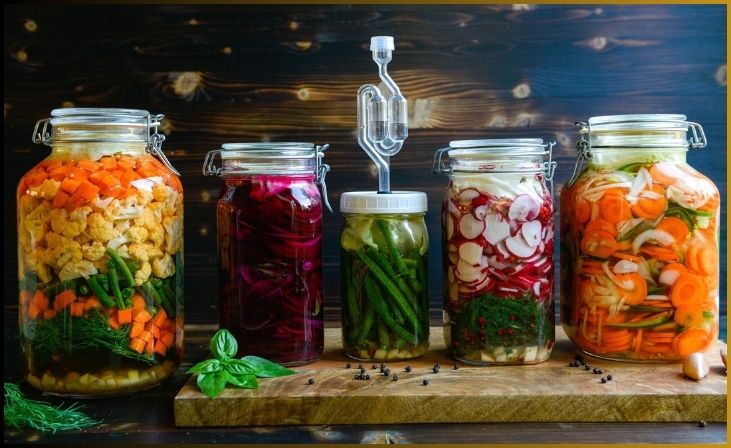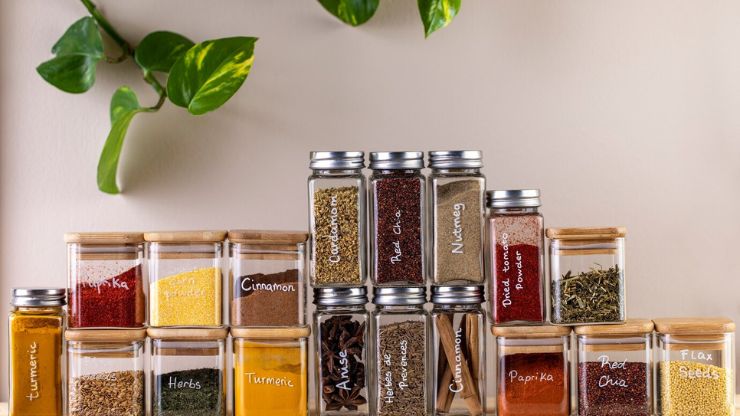Prepare to embark on a culinary adventure where tradition and innovation converge, introducing a burst of flavor that transcends the ordinary. In this blog, we unravel the art of using fermented herbs in recipes, transforming your kitchen into a haven of aromatic delights and healthful discoveries.
From the ancient wisdom of fermentation to the modern palate, we explore the myriad ways to infuse your dishes with the magic of fermented herbs. Whether you’re a seasoned chef seeking new dimensions or an adventurous home cook eager to elevate your meals, join us on this journey where each recipe becomes a canvas for the extraordinary. Let the flavor revolution begin as we delve into the secrets and creative possibilities of using fermented herbs to redefine your culinary experience.
Table of Contents
ToggleThe Essence of Fermented Herbs
Before we delve into the myriad ways to use fermented herbs, let’s understand the essence of this transformative process. Fermentation not only preserves the vitality and freshness of herbs but also infuses them with a complexity of flavors, creating a harmonious balance that goes beyond the ordinary.
Choosing Your Herbs: Selecting the right herbs is the first step to a successful fermentation journey. Whether it’s the robust notes of rosemary, the citrusy zing of thyme, or the fresh burst of cilantro, each herb brings its unique character to the table.
Fermentation Medium: To kickstart the fermentation process, you’ll need a medium, such as a brine solution or a combination of salt and sugar. This not only preserves the herbs but also encourages the growth of beneficial bacteria, turning them into probiotic powerhouses.
Patience is a Virtue: Allowing the herbs to ferment is a lesson in patience. The process can take days to weeks, depending on the herbs and your desired flavor profile. During this time, the herbs undergo a transformation, developing nuanced flavors and a delightful tang.
For More- How to Make Fermented Russian Dressing
Using Fermented Herbs in Recipes
Now, let’s explore the exciting ways to incorporate these flavor-packed gems into your culinary creations.
Herb-Infused Oils and Vinegars
Herb-infused oils and vinegars stand as a testament to the exquisite fusion of nature’s bounty and culinary craftsmanship. To create these aromatic elixirs, fresh herbs, such as basil, rosemary, or thyme, are meticulously combined with high-quality olive oil or vinegar. The herbs, often fermented for added depth, infuse their essence into the liquid medium, resulting in a symphony of flavors that transcends the ordinary.
Whether drizzled over a crisp salad, used as a marinade for meats, or as a finishing touch to roasted vegetables, these herb-infused oils and vinegars elevate every dish they touch. The fragrant marriage of herbs and liquids not only imparts a rich taste but also adds a visual allure to your culinary creations, making herb-infused oils and vinegars an indispensable tool for any culinary enthusiast seeking to transform ordinary meals into extraordinary culinary experiences.
Probiotic Pesto
Probiotic Pesto is a culinary masterpiece that seamlessly merges the classic charm of traditional pesto with the healthful benefits of probiotics. This vibrant sauce typically includes fresh basil, pine nuts, Parmesan cheese, garlic, and extra virgin olive oil. What sets it apart is the addition of probiotic-rich ingredients or fermentation, introducing beneficial bacteria that contribute to a thriving gut microbiome.
Don't just scroll, subscribe!
BuzzTrail's unique web-stories are the cure for boredom you've been waiting for.
The fermentation process not only enhances the flavor profile, creating a nuanced and tangy taste, but also adds a nutritional dimension to this beloved condiment. Probiotic pesto serves as a versatile companion, elevating pasta dishes, sandwiches, or even as a dip. With its delightful blend of taste and health benefits, Probiotic Pesto is a culinary innovation that caters to both the palate and the well-being of those savoring its delectable notes.
Fermented Herb Butter
Fermented Herb Butter is a culinary gem that transforms ordinary butter into a gourmet delight, infusing it with the aromatic essence of fermented herbs. This process typically involves blending fresh herbs, such as parsley, thyme, or chives, into softened butter, along with a touch of salt. The mixture is then left to undergo fermentation, allowing the flavors to meld and intensify.
The result is a savory, herb-infused butter with a rich, nuanced taste and a hint of tanginess from the fermentation process. This versatile condiment serves as a luxurious spread for bread, an exquisite finishing touch for grilled meats, or a flavorful addition to vegetables. Fermented Herb Butter not only elevates the taste of dishes but also introduces the healthful benefits of probiotics, making it a must-have for those seeking a culinary experience that harmonizes both flavor and well-being.
Flavorful Marinades
Flavorful marinades are the secret weapon in a chef’s arsenal, transforming ordinary proteins into culinary masterpieces. Comprising a harmonious blend of herbs, spices, oils, and acidic components, these concoctions infuse meats with an explosion of taste and tenderness. The magic lies in the careful selection of ingredients, from aromatic herbs like rosemary and thyme to zesty citrus and savory soy sauce. Whether grilling, roasting, or pan-searing, these marinades not only enhance the natural flavors of meats but also impart a unique character that tantalizes the taste buds.
The beauty of flavorful marinades lies in their versatility—use them for chicken, beef, seafood, or even plant-based alternatives to elevate your dishes to new heights of culinary delight. With the right combination of ingredients, time, and technique, flavorful marinades ensure each bite is a symphony of savory, sweet, and tangy notes.
Fermented Herb Salt

Fermented Herb Salt is a culinary alchemy that marries the intense flavors of fermented herbs with the simplicity of salt, resulting in a versatile and aromatic condiment. The process involves combining finely chopped or powdered fermented herbs, such as rosemary, thyme, or oregano, with high-quality sea salt. The mixture undergoes fermentation, allowing the herbs to infuse their essence into the salt crystals, creating a dynamic and flavorful blend.
This herbaceous salt adds depth to dishes as a seasoning during cooking or as a finishing touch. Sprinkle it on roasted vegetables, grilled meats, or even use it as a rim for cocktail glasses for an extra layer of taste. Fermented Herb Salt not only enhances the overall flavor profile of dishes but also brings the health benefits of probiotics to the table, making it a delightful and wholesome addition to any culinary repertoire.
Herbal Beverages
Herbal beverages offer a refreshing departure from conventional drinks, infusing the goodness of nature into every sip. From soothing teas to invigorating infusions, these beverages harness the aromatic and healthful properties of various herbs. Mint, chamomile, lavender, and lemon balm are just a few examples that elevate the beverage experience. For a creative twist, consider fermenting herbs to add a layer of depth and probiotic goodness.
Herbal-infused simple syrups can sweeten cocktails, while fermented mint and lemon balm bring a zesty kick to iced teas. These beverages not only provide a welcome break from the ordinary but also serve as a delightful way to incorporate the benefits of herbs into your daily routine. Whether enjoyed hot or cold, herbal beverages are a celebration of nature’s flavors, offering a sensory journey with every delightful sip.
Also Read- An Amazing Fermented Basil Pesto Recipe
Conclusion
As you embark on the journey of using fermented herbs in your recipes, remember that the possibilities are as vast as your culinary imagination. Whether you’re a seasoned chef or a kitchen novice, the transformative power of fermented herbs invites you to experiment, create, and savor a world of flavors that transcend the ordinary. Embrace the ancient wisdom of fermentation, and let your culinary creations become a testament to the magical marriage of tradition and innovation in the realm of gastronomy. May your dishes be forever elevated by the essence of fermented herbs!
FAQs
What herbs are suitable for fermentation?
What herbs are suitable for fermentation?
Common herbs like basil, rosemary, thyme, mint, and cilantro are excellent choices. Experiment with your favorites to discover unique flavor profiles.
How long does it take to ferment herbs?
How long does it take to ferment herbs?
Fermentation time varies. Some herbs may take a few days, while others, like rosemary, can take a couple of weeks. Monitor the process and taste for desired tanginess.
Can I use fermented herbs interchangeably with fresh ones in recipes?
Can I use fermented herbs interchangeably with fresh ones in recipes?
Absolutely! Fermented herbs can be a flavorful substitute for fresh ones. Adjust quantities based on taste, as fermented herbs may have a more concentrated flavor.

